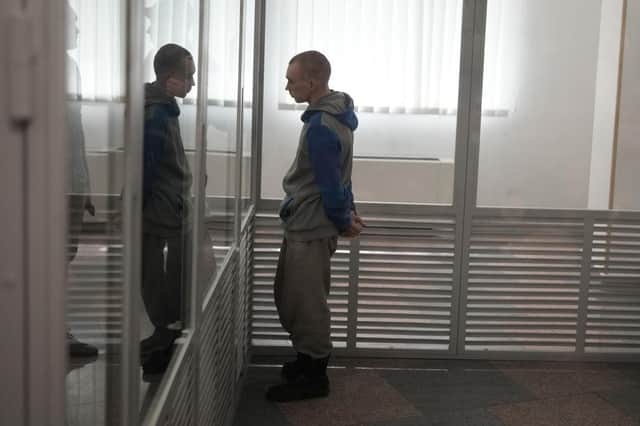Warnings over Ukraine-Russia war crime accusations turning into ‘lawfare’


Last week, the head of Russia's investigative committee, Alexander Bastrykin, said Moscow had charged 92 members of the Ukrainian armed forces with crimes against humanity, adding that over 1,300 criminal investigations had begun – with some 96 people, including 51 armed forces commanders, already on Ruissia's wanted list.
Meanwhile, Ukraine recently revealed it has identified more than 21,000 possible war crimes, and in May, jailed a Russian tank commander for life for killing a civilian at the first war crimes trial since the conflict began.
Advertisement
Hide AdAdvertisement
Hide AdThe sentencing of tank commander Vadim Shishimarin, 21, took place in May after the Russian soldier admitted shooting 62-year-old Oleksandr Shelipov in the head just days after the invasion began. The judge ruled he had committed "a crime against peace, security, humanity and the international legal order" and told him that only a life sentence was appropriate.
The International Criminal Court (ICC) has described Ukraine as a "crime scene” since it sent its largest ever team of investigators to the country shortly after war broke out.
However, it has not yet made any accusations against individuals. To be classed as crimes against humanity, attacks have to be part of what the ICC’s founding treaty, the Rome Statute, calls “a widespread or systematic attack directed against any civilian population”.
Russia has denied all accusations of war crimes, insisting that its invasion, which it calls a “special military operation”, is aimed at de-Nazifying Ukraine. In turn, Ukraine has rubbished claims of Nazi influences in the country.
Professor Anthony Lang, chair in International Political Theory at the University of St Andrews, warned national courts holding war crime trials while a conflict is still going on was potentially unjust.
He said: “The idea of war crimes gets thrown around a lot in international affairs. In the last 50 years, there has been a move to using law as part of a conflict, which is sometimes called “lawfare”. It is becoming more common and that's not a good thing and is just a further method of warfare. In the midst of a conflict, I think it's OK if an institution like the ICC seeks to deal with these things. But if national courts are seeking to deal with them, that seems to be not really productive, it just seems like a further continuation of the war through other means.”
“It is highly unlikely that someone accused of war crimes would be able to get a fair trial in Russia, or Ukraine, such as in the case of the tank commander - especially during the conflict, when tensions are high and emotions are high. I think that's a really bad idea. The better way to go is to turn to the institutions like the International Criminal Court.”
While Ukraine is signed up to the ICC, however, Russia is not, although cases could be brought against Russians for crimes committed on Ukrainian soil – although physically bringing them to justice could potentially be more difficult.
Advertisement
Hide AdAdvertisement
Hide AdOnly high profile individuals, such as country leaders or top military officials are likely to be tried by the ICC, while any accusations are now made against individual people, rather than a nation.
Mr Bastrykin last week rejected the idea of a United Nations-backed trial for any Ukrainian military personnel accused of war crimes and instead proposed an international tribunal backed by countries including Iran, Syria and Bolivia - traditional allies of Russia, a move which Prof Lang described as the Kremlin “thumbing its nose” at the international community.
Prof Lang said that even if no tangible action could be taken against Russians accused of war crimes, such as president Vladimir Putin, taking action would send a message to the international community.
"It doesn't mean that the ICC can't pursue an investigation of Russian leaders, because since the conflict is happening in Ukrainian territory, it's possible,” he said. “But it's unlikely that any Russians would be sent to the to the Hague to be tried.
“However, even if they can't put these people in jail, or no punishment is inflicted upon them, it's good for the international community in the long term. There’s something called an expressionist purpose behind law, which is to express the will of the international community.
"So even if someone is tried in absentia and is found guilty, that can be good because it strengthens international law, it strengthens the International Criminal Court.”
Ukrainian Prosecutor General Iryna Venediktova has previously said that she receives reports of between 200 to 300 war crimes a day, but admitted that many trials would be held in absentia. She said she believedthat it was "a question of justice" to continue with the prosecutions.
Comments
Want to join the conversation? Please or to comment on this article.
